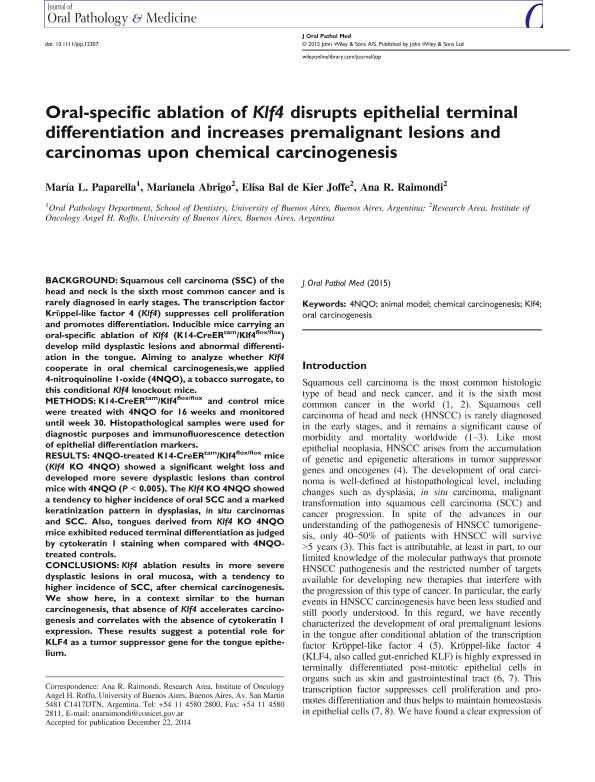Artículo
Oral-specific ablation of Klf4 disrupts epithelial terminal differentiation and increases premalignant lesions and carcinomas upon chemical carcinogenesis
Fecha de publicación:
11/2015
Editorial:
Wiley Blackwell Publishing, Inc
Revista:
Journal Of Oral Pathology And Medicine
ISSN:
0904-2512
Idioma:
Inglés
Tipo de recurso:
Artículo publicado
Clasificación temática:
Resumen
Background: Squamous cell carcinoma (SSC) of the head and neck is the sixth most common cancer and is rarely diagnosed in early stages. The transcription factor Krvppel-like factor 4 (Klf4) suppresses cell proliferation and promotes differentiation. Inducible mice carrying an oral-specific ablation of Klf4 (K14-CreERtam/Klf4flox/flox) develop mild dysplastic lesions and abnormal differentiation in the tongue. Aiming to analyze whether Klf4 cooperate in oral chemical carcinogenesis,we applied 4-nitroquinoline 1-oxide (4NQO), a tobacco surrogate, to this conditional Klf4 knockout mice. Methods: K14-CreERtam/Klf4flox/flox and control mice were treated with 4NQO for 16 weeks and monitored until week 30. Histopathological samples were used for diagnostic purposes and immunofluorescence detection of epithelial differentiation markers. Results: 4NQO-treated K14-CreERtam/Klf4flox/flox mice (Klf4KO 4NQO) showed a significant weight loss and developed more severe dysplastic lesions than control mice with 4NQO (P < 0.005). The Klf4KO 4NQO showed a tendency to higher incidence of oral SCC and a marked keratinization pattern in dysplasias, in situ carcinomas and SCC. Also, tongues derived from Klf4KO 4NQO mice exhibited reduced terminal differentiation as judged by cytokeratin 1 staining when compared with 4NQO-treated controls. Conclusions: Klf4 ablation results in more severe dysplastic lesions in oral mucosa, with a tendency to higher incidence of SCC, after chemical carcinogenesis. We show here, in a context similar to the human carcinogenesis, that absence of Klf4 accelerates carcinogenesis and correlates with the absence of cytokeratin 1 expression. These results suggest a potential role for KLF4 as a tumor suppressor gene for the tongue epithelium.
Palabras clave:
4nqo
,
Animal Model
,
Chemical Carcinogenesis
,
Klf4
,
Oral Carcinogenesis
Archivos asociados
Licencia
Identificadores
Colecciones
Articulos(IFIBYNE)
Articulos de INST.DE FISIOL., BIOL.MOLECULAR Y NEUROCIENCIAS
Articulos de INST.DE FISIOL., BIOL.MOLECULAR Y NEUROCIENCIAS
Citación
Paparella, María L.; Abrigo, Marianela; Bal de Kier Joffe, Elisa; Raimondi, Ana Rosa; Oral-specific ablation of Klf4 disrupts epithelial terminal differentiation and increases premalignant lesions and carcinomas upon chemical carcinogenesis; Wiley Blackwell Publishing, Inc; Journal Of Oral Pathology And Medicine; 44; 10; 11-2015; 801-809
Compartir
Altmétricas




